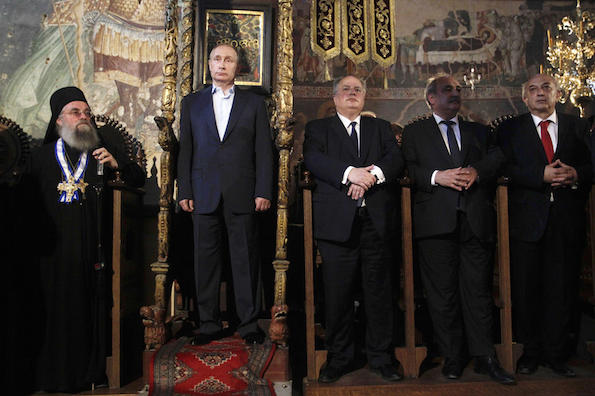Religion
Related: About this forumBetween Greece and Russia, faith and diplomacy connect in curious ways

May 29th 2016, 11:38 BY ERASMUS
ON THE face of things, the last few days have been a time of flourishing Greco-Russian amity, rooted in a common Orthodox Christian faith. As the ceremonial high point of Vladimir Putin’s visit to Greece, one of the few European Union members where he can count on a warm welcome, the Russian leader paid a visit to the ancient monastic polity of Mount Athos. He was received with pomp and ceremony not only by the leaders of the peninsula’s 20 monasteries but by Greece’s worldly head of state, President Prokopis Pavlopoulos. “Today as we resurrect the values of patriotism, historical memory and traditional culture, we hope for a strengthening of relations with Mount Athos,” Mr Putin declared.
But as any historian of that part of the world can tell you, having a common creed and a common reverence for the same holy places and rites doesn’t always make for smooth diplomatic relations. Nations of the same faith can compete as well as co-operate. A good example of this is the events that unfolded just over a century ago in the huge Russian monastery of St Panteleimon which was part of the presidential itinerary at Mt Athos.
In the summer of 1913, the tsarist navy made an extraordinary intervention in the affairs of the monastic peninsula and deported about 800 Russian monks, from St Panteleimon and elsewhere, as punishment for being on the losing side of a raging theological argument. (Roughly speaking, it was over whether the words like God and Jesus are holy in themselves, or only because of the divine realities they denote. Humble monks, and a few quite sophisticated ones, felt that the latter view denied the spiritual experiences they had when repeating the name of Jesus; but they lost out.)
Although this theological dispute was mainly confined to the vast Russian contingent on the holy mountain, it unfolded against the background of intense geopolitical competition over the future of Mount Athos.
http://www.economist.com/blogs/erasmus/2016/05/greece-russia-and-religious-diplomacy
However, it's worth pointing out that this is the problem when there's a national church, as opposed to a more nebulous "state religion." It's with state churches that you can easily get all kinds of mix-ups between religion and nationalism, because they're two facets of the same gem.
France or Maryland could be Catholic but that's different from a hypothetical "French Catholic Church." If France and Spain fought, it really was an issue for the Pope who in some sense was over both churches. Unlike the Russian Patriarch, who is over Russian orthodox folk and the Greek patriarch over the Greek orthodox believers. (Then there's Macedonian, Ukrainian I and II, Romanian, etc., etc.)
There are differences between the various orthodoxies, rivalries, etc. Esp. Greek and Russian, which are alike but mixed up with all that old "Third Rome" BS and Greek influence on medieval Russian liturgical practice and Russian schisms and jurisdiction. Studying Russian in Oregon in the '80s you necessarily ran into some Starovery who had fled to establish their own little "mini-states" elsewhere, since blessing with the wrong number of fingers simply wasn't allowed. And let's not discuss the direction the hand moves when you cross yourself.
It also plays out in the Donbas, where the DNR and LNR folk have closed or persecuted the "unacceptable" Ukrainian Orthodox churches that don't acknowledge Russian supremacy. It happened in the Crimea, as well, where the "righteous" have gone in, shut down services mid-service, and beaten priests and parishioners. Nationalism runs deep when it becomes mixed with a state church and the state church is considered part of the culture. \
As for the sacred status of "Jesus," I'd note the tendency for some other sects to insist on "G-d", refusing to continue to even know how to pronounce YHWH or who insist on the "sacred name" being used. "No, you can't say 'Jesus,' you must say 'Yeshua'!" ![]()
rug
(82,333 posts)Brettongarcia
(2,262 posts)Ironically, the strongest cultural tie between Russia and Greece in the 20th century, was probably not religion, but its opposite: leftist atheist communism. The Greek communist party or left was embattled, but vigorous.
By the way, given so many historical problems with not only religious sectarianism but also, related to that, the wars of nationalism, that tie was often not "patriotic," as much as explicitly internationalist.